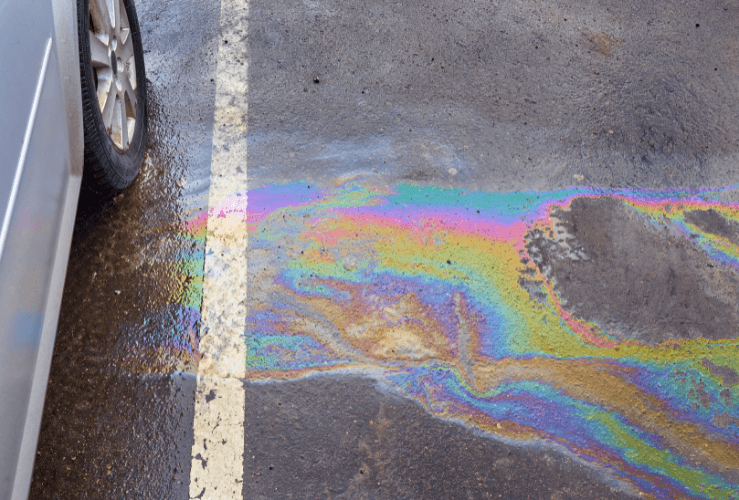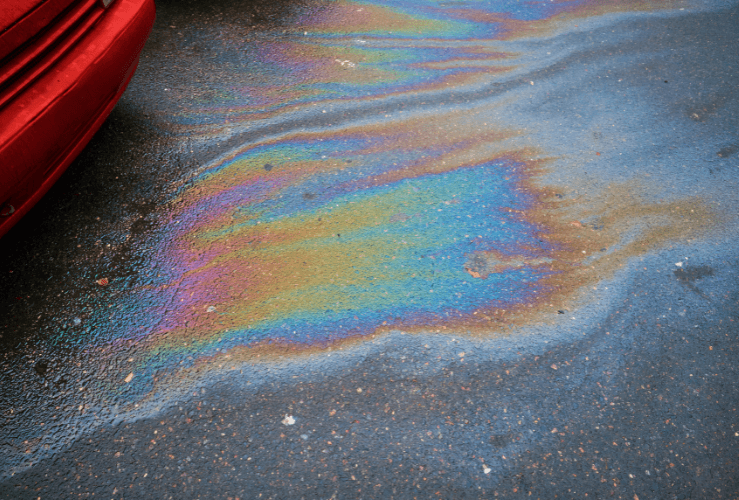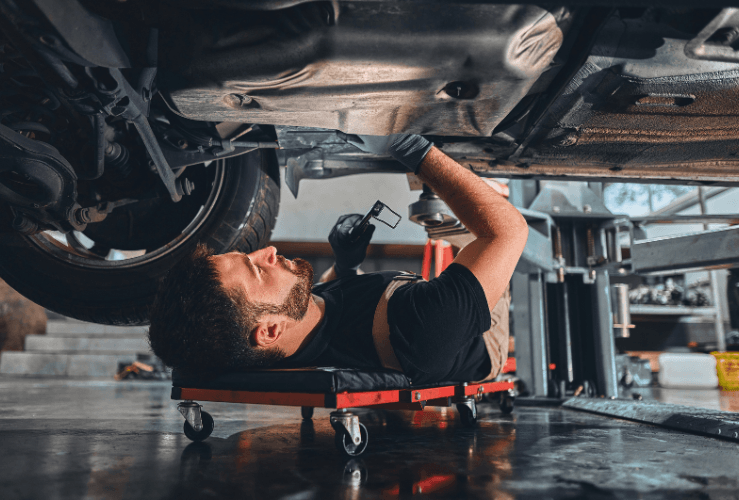If you discover your car is leaking fuel, you need to get it repaired as soon as possible. Ideally, you would not drive the vehicle until the issue has been addressed.

How to check for fuel leaking from my car?
If you see a brownish patch of fuel under your vehicle, which looks rainbow-coloured when the light reflects off it, it's a sign your vehicle is leaking fuel.
Both petrol and diesel look like this, and give off that familiar fuel station smell - which is another tell-tale sign.
If you notice your car is leaking water or another liquid which you are certain isn’t fuel, you can find out more about the type of leak your car may have in our article, Water is leaking from under my car: What should I do?
Asides from a brownish patch under your car, other fuel leak signs include a fall in fuel efficiency: if you notice you need to refuel more often, it could be a sign of a fuel leak. Look for puddles of fuel/odour, as mentioned above.
An illuminated Check Engine Light could be another sign you have a fuel leak - although this can be triggered for other reasons.
You may also notice a hissing sound, which may suggest fuel is escaping.
If you can, inspect the fuel tank and fuel lines for any damage.
Additionally, a metallic smell may suggest corrosion is taking place on the fuel tank/fuel lines - which may lead to a fuel leak (or may have already caused one).

Common causes of leaking fuel
Damaged fuel tank
A damaged fuel tank is one of the more common causes of a fuel leak.
While you may find advice online on how to make a temporary repair, unless you have substantial mechanical know-how, the safest option is to take it to a garage for repairs. Fixes will likely involve welding and patching, rebarreling, or repairing the tank, all of which are too complex and time consuming for most car owners.
Damaged fuel lines
As you might expect, fuel lines are the pipes that carry fuel from the tank to the engine. These may corrode or get damaged over time due to normal wear and tear, or sustain a crack after an accident.
Fuel line damage can result in a fuel leak.
Faulty fuel injector
A leak may also be caused by fuel injector damage.
If you have the required technical knowledge, undertake an inspection.
Leaking fuel filter
If your car's fuel filter has been damaged or incorrectly installed, a fuel leak may result.
Faulty fuel pressure regulator
Any issues with your fuel pressure regulator may cause too much pressure, causing a fuel leak.
Damaged fuel cap
While less common, a damaged fuel cap can also cause fuel to leak.

How much to get a fuel leak fixed?
Damage to a fuel tank and/or fuel lines are among the likely causes of fuel leaks. Repair costs can vary greatly depending on the extent of the damage, the make and model of the car, and of course the pricing structure of your garage. Note that independent garages are nearly always cheaper than dealership services.
As a rough guide, a complete fuel tank replacement costs around £450. However, an experienced mechanic may be able to effect a repair, which should be considerably less.
Fuel line replacement costs between £80 - 150.
Having your fuel injector replaced will cost between £120 - 160.
Fuel pressure regulators cost around £250 to swap out.
Having a new fuel filter will cost about £80.
Fuel caps can be bought inexpensively online.
Fuel leak: Should I take my car to a garage?
Unless you have sufficient mechanical knowledge and experience, you should take your car to a garage to have any fuel leak addressed.
If possible, don’t drive a vehicle with a fuel leak - since petrol and diesel are extremely flammable, and you'll waste a lot of fuel.





